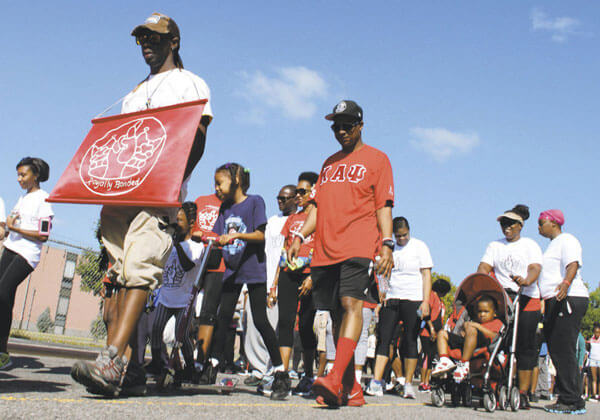By Naeisha Rose
The Queens Sickle Advocacy Network, Inc. is marking Sickle Cell Awareness Month with its 17th annual Walk-A-Thon on Sept. 9.
QSCAN wants to raise $100,000 for awareness, education, research and support of clinical trials. The event will be held in conjunction with the National Sickle Cell Disease Association of America.
The Walk-A-Thon will start at York College at 160th Street and Liberty Avenue in Jamaica and stretch to Roy Wilkins Park in St. Albans, according to QSCAN founder Gloria Rochester.
A steel band and drummers will march with participants to Roy Wilkins Park. Massage therapists will be available at the end of the nearly 1.9-mile trek. There will be a large cake for birthday celebrations for people with the disease who were born from August to October, according to Rochester. R&B, gospel and hip-hop music will be featured. A pavilion will offer free books and face painting for kids.
“To celebrate a birthday is the milestone of a person,” Rochester said. “You never know with the way sickle cell goes. They can just die, they pass, and they are gone.”
The disease is an inherited blood disorder in which people have abnormal hemoglobin, according to the National Heart, Lung and Blood Institute. Individuals with the disease have cells shaped like a sickle. The cells are not capable of carrying hemoglobin, which is necessary for oxygen in the lung and tissues of the body, according to the Centers for Disease Control.
In the 1970s, many of the 90,000 to 100,000 Americans with sickle cell disease did not make it past their 20th birthday when it was not caught early, according to the CDC. One in 365 blacks is born with SCD. For Hispanic Americans, the ratio is one in 16,300. One in 13 blacks carry the trait for the disease, according to the CDC.
Thanks to research and medical intervention, diagnosed Americans now make it to their 40th to 60th birthdays.
Sickle Cell can result in chronic pain, strokes, susceptibility to organ failure and acute chest syndrome, and lack of oxygen in the lungs, according to the NHLBI.
To mitigate the problems that come with the disease individuals can take Hydroxyurea, an oral medication for children and adults, according to NHLBI.
At the event, participants and guests will be given light sandwiches, water and fruits, and have a chance to be a part of Zumba fitness class. Maintaining a well-balanced diet and a healthy lifestyle is essential if you have SCD, according to the CDC.
“Being healthy will delay a sickle cell crisis and keep you out of the hospitals. Otherwise your organs will shut down if you don’t take care of yourself,” said Rochester, who is the mother of a child with the disease.
New York State of Health, an insurance marketplace, will be there to help sign people up for insurance and a doctor will be there to talk about the condition, according to Rochester.
She said individuals will also get to testify about their experience with the disease.
Be The Match, an organization that does bone marrow transplants, will be at the event to get swabs from individuals to test for the disease, according to the QSCAN founder.
Since 2011, hematopoietic stem cell transplantation has been the only cure for the disease. Healthy individuals who are genetic matches on Be The Match can find out if they can be bone marrow donors for family, friends, or complete strangers.
The state of health care is precarious under the Trump administration, and help with SCD might become more expensive because it is considered a pre-existing condition.
“We really need people to unite and take this health care situation seriously for people who have a pre-existing condition,” Rochester said.
It can take years for some people to find the perfect match for a transplant. A bone marrow transplant could leave a person at risk for a life-threatening infection, according to the National Marrow Donor Program.
Rochester hopes the money raised for future clinical trials will come up with a less-risky cure. The funds from the walk will also go toward scholarships for people with the disease. She is also seeking a new office to continue her work and provide a space for those with the disease to congregate and learn from each other’s experience.
Reach reporter Naeisha Rose by e-mail at nrose



































